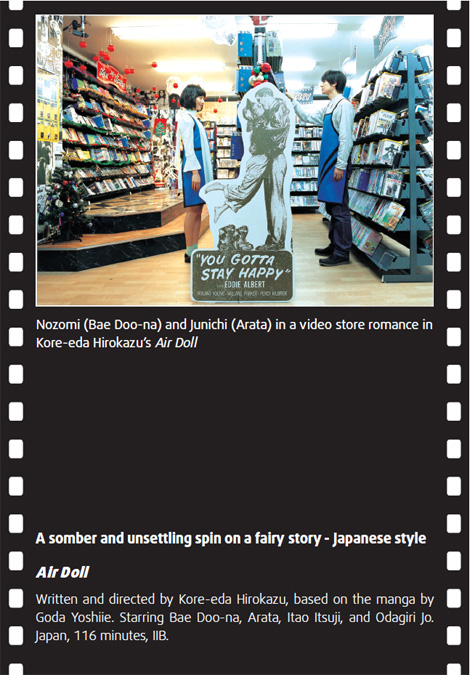Signs of life in Air Doll's air doll
Updated: 2010-02-06 06:55
By Elizabeth Kerr(HK Edition)
|
|||||||||
Hirokazu Kore-eda has become the poster boy for highbrow Japanese cinema very quickly. There's no disputing he's a good filmmaker. He's just not the genius (or savior) he's held up to be - and I believe I just committed blasphemy in some circles. What Kore-eda does do well is examine our very modern and urban sense of isolation. In Afterlife, Kore-eda's characters had to die to connect with other people. In Distance they had to survive a cult suicide. He's probably known best for the complex and carefully considered Nobody Knows - about four young children abandoned by their mother and left to fend for themselves. His latest, the intensely morose Air Doll, dovetails with the rest of his oeuvre.
If you took a little bit of Pinocchio, mixed it with a touch of Mannequin, and topped it off with a dash of Lars and the Real Girl, what you'd have is the recipe for indie darling Kore-eda's adaptation of Goda Yoshiie's 2000 manga. In a nutshell, the film is the story of a toy that comes to life, finds a soul and then goes out on a journey of self-discovery while somehow touching the lives of every one around it. That's pretty much what goes on here, but with more sex.
Hideo (Itao Itsuji, 9 Souls) is a lonely, middle-aged man living in Tokyo. We meet him as he heads home from work (we assume he's a salaryman) and greets his adoring wife before dinner. Turns out she's not so much adoring as she is neutral. Nozomi (Bae Doo-na, The Host) is a blow-up sex doll - and a really high quality one at that. Hideo talks to her, tells her about his day, dines with her, and then they go to bed - in every sense of the word. The next day, Nozomi gets up, walks to the window and comes to life: She's found a heart. Once she dresses in the requisite Harajuku fashions she finds lying around the flat and dons her suitably naive persona, she goes out. Tokyo is baffling and overwhelming (who knew an average suburban street was so astonishing?), but she fits in with the other lonely souls in the neighborhood. She also takes a job at the local DVD shop and finds love with Junichi (Arata, Afterlife).
The opening segment sets up a nicely-understated tone of loneliness and isolation that Air Doll never shakes, much to its credit. It's tricky to look at Hideo initially without seeing him as anything but simultaneously pathetic and disgusting. You want to scream, "Loser!" at him, but Kore-eda slowly reveals little bits of Hideo's life that make such sweeping condemnation unfair. Conversely, Junichi comes across as more grounded, but every bit as sad. That he finds an emotional connection with a woman that's literally hollow says as much about him as it does about Nozomi's curiosity.
The rest of the characters that drift in and out of Nozomi's life, as it were, are drawn as little more than archetypical sketches, but Kore-eda uses them to make a point about our collective urban misery and anonymity. There's an OL who fears she's being squeezed out of her job by a younger woman, a single dad, a couple of local crazies, a widower (possibly previously divorced) who can't let go of his wife, and a beat cop with little to do at his dead-end post. There's also Sonoda (Odagiri Jo, The Warrior and the Wolf), Nozomi's creator, who's something of a hermit. All of them serve the single goal of proving how fundamentally separate they all are from each other - and, by extension,we in the audience from the others among us.
But it's Nozomi's story and Bae's movie, and there's a whole lot more going on in Air Doll than a grand meditation on loneliness, and some of it's a little harder to swallow. Kore-eda isn't an insensitive filmmaker, and so some of the more eccentric images he packs into Air Doll seem out of place given his body of work. Nozomi proves to have a particularly dangerous kind of sexuality once she finds it (yes, it's the old fear of the lusty female again), and the childlike demeanor that Hideo and Junichi both find so appealing is disturbingly contrary to that. Is it necessary to point out that the entire endeavor hinges on a Korean woman pretending to be what amounts to a Japanese man's sex slave? Intentional or not, that's a loaded image if ever there was one.
Bae turns in a brave performance that could easily get her blacklisted in her native South Korea. She manages to navigate the film's dodgier aspects gracefully and is convincing as a vaguely lost person out of her element and seeking a connective identity. She balances wonder, trepidation and bitter revelation in such a way that empowers Nozomi and lifts the whole film above and beyond Kore-eda's own missteps.
Air Doll opened in Hong Kong Thursday.

(HK Edition 02/06/2010 page4)